#he fundamentally doesn't understand how important to people he is
Text
Academic economists get big payouts when they help monopolists beat antitrust
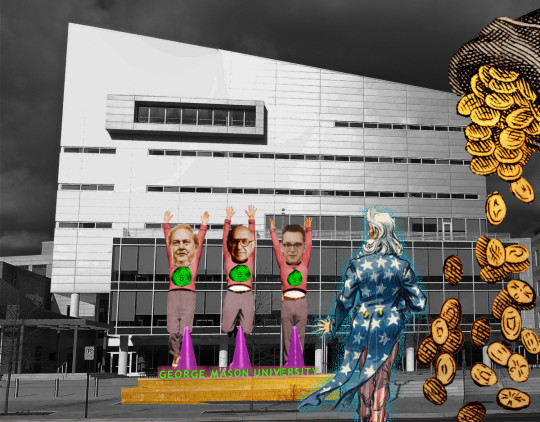
After 40 years of rampant corporate crime, there's a new sheriff in town: Jonathan Kanter was appointed by Biden to run the DOJ Antitrust Divisoon, and he's overseen 170 "significant antitrust actions" in the past 2.5 years, culminating in a court case where Google was ruled to be an illegal monopolist:
https://pluralistic.net/2024/08/07/revealed-preferences/#extinguish-v-improve
Kanter's work is both extraordinary and par for the course. As Kanter said in a recent keynote for the Fordham Law Competition Law Institute’s 51st Annual Conference on International Antitrust Law and Policy, we're witnessing an epochal, global resurgence of antitrust:
https://www.justice.gov/opa/speech/assistant-attorney-general-jonathan-kanter-delivers-remarks-fordham-competition-law-0
Kanter's incredible enforcement track record isn't just part of a national trend – his colleagues in the FTC, CFPB and other agencies have also been pursuing an antitrust agenda not seen in generations – but also a worldwide trend. Antitrust enforcers in Canada, the UK, the EU, South Korea, Australia, Japan and even China are all taking aim at smashing corporate monopolies. Not only are they racking up impressive victories against these giant corporations, they're stealing the companies' swagger. After all, the point of enforcement isn't just to punish wrongdoing, but also to deter wrongdoing by others.
Until recently, companies hurled themselves into illegal schemes (mergers, predatory pricing, tying, refusals to deal, etc) without fear or hesitation. Now, many of these habitual offenders are breaking the habit, giving up before they've even tried. Take Wiz, a startup that turned down Google's record-shattering $23b buyout offer, understanding that the attempt would draw more antitrust scrutiny than it was worth:
https://finance.yahoo.com/news/wiz-turns-down-23-billion-022926296.html
As welcome as this antitrust renaissance is, it prompts an important question: why didn't we enforce antitrust law for the 40 years between Reagan and Biden?
That's what Kanter addresses the majority of his remarks to. The short answer is: crooked academic economists took bribes from monopolists and would-be monopolists to falsify their research on the impacts of monopolists, and made millions (literally – one guy made over $100m at this) testifying that monopolies were good and efficient.
After all, governments aren't just there to enforce rules – they have to make the rules first, and do to that, they need to understand how the world works, so they can understand how to fix the places where it's broken. That's where experts come in, filling regulators' dockets and juries' ears with truthful, factual testimony about their research. Experts can still be wrong, of course, but when the system works well, they're only wrong by accident.
The system doesn't work well. Back in the 1950s, the tobacco industry was threatened by the growing scientific consensus that smoking caused cancer. Industry scientists confirmed this finding. In response, the industry paid statisticians, doctors and scientists to produce deceptive research reports and testimony about the tobacco/cancer link.
The point of this work wasn't necessarily to convince people that tobacco was safe – rather, it was to create the sense that the safety of tobacco was a fundamentally unanswerable question. "Experts disagree," and you're not qualified to figure out who's right and who's wrong, so just stop trying to figure it out and light up.
In other words, Big Tobacco's cancer denial playbook wasn't so much an attack on "the truth" as it was an attack on epistemology – the system by which we figure out what is true and what isn't. The tactic was devastatingly effective. Not only did it allow the tobacco giants to kill millions of people with impunity, it allowed them to reap billions of dollars by doing so.
Since then, epistemology has been under sustained assault. By the 1970s, Big Oil knew that its products would render the Earth unfit for human habitation, and they hired the same companies that had abetted Big Tobacco's mass murder to provide cover for their own slow-motion, planetary scale killing spree.
Time and again, big business has used assaults on epistemology to provide cover for unthinkable crimes. This has given rise to today's epistemological crisis, in which we don't merely disagree about what is true, but (far more importantly) disagree about how the truth can be known:
https://pluralistic.net/2024/03/25/black-boxes/#when-you-know-you-know
Ask a conspiratorialist why they believe in Qanon or Hatians in Springfield eating pets, and you'll get an extremely vibes-based answer – fundamentally, they believe it because it feels true. As the old saying goes, you can't reason someone out of a belief they didn't reason their way into.
This assault on reason itself is at the core of Kanter's critique. He starts off by listing three cases in which academic economists allowed themselves to be corrupted by the monopolies they studied:
George Mason University tricked an international antitrust enforcer into attending a training seminar that they believed to be affiliated with the US government. It was actually sponsored by the very companies that enforcer was scrutnizing, and featured a parade of "experts" who asserted that these companies were great, actually.
An academic from GMU – which receives substantial tech industry funding – signed an amicus brief opposing an enforcement action against their funders. The academic also presented a defense of these funders to the OECD, all while posing as a neutral academic and not disclosing their funding sources.
An ex-GMU economist, Joshua Wright, submitted a study defending Qualcomm against the FTC, without disclosing that he'd been paid to do so. Wright has elevated undisclosed conflicts of interest to an art form:
https://www.wsj.com/us-news/law/google-lawyer-secret-weapon-joshua-wright-c98d5a31
Kanter is at pains to point out that these three examples aren't exceptional. The economics profession – whose core tenet is "incentive matter" – has made it standard practice for individual researchers and their academic institutions to take massive sums from giant corporations. Incredibly, they insist that this has nothing to do with their support of monopolies as "efficient."
Academic centers often serve as money-laundries for monopolist funders; researchers can evade disclosure requirements when they publish in journals or testify in court, saying only that they work for some esteemed university, without noting that the university is utterly dependent on money from the companies they're defending.
Now, Kanter is a lawyer, not an academic, and that means that his job is to advocate for positions, and he's at pains to say that he's got nothing but respect for ideological advocacy. What he's objecting to is partisan advocacy dressed up as impartial expertise.
For Kanter, mixing advocacy with expertise doesn't create expert advocacy – it obliterates expertise, as least when it comes to making good policy. This mixing has created a "crisis of expertise…a pervasive breakdown in the distinction between expertise and advocacy in competition policy."
The point of an independent academia, enshrined in the American Association of University Professors' charter, is to "advance knowledge by the unrestricted research and unfettered discussion of impartial investigators." We need an independent academy, because "to be of use to the legislator or the administrator, [an academic] must enjoy their complete confidence in the disinterestedness of [his or her] conclusions."
It's hard to overstate just how much money economists can make by defending monopolies. Writing for The American Prospect, Robert Kuttner gives the rate at $1,000/hour. Monopoly's top defenders make unimaginable sums, like U Chicago's Dennis Carlton, who's brought in over $100m in consulting fees:
https://prospect.org/economy/2024-09-24-economists-as-apologists/
The hidden cost of all of this is epistemological consensus. As Tim Harford writes in his 2021 book The Data Detective, the truth can be known through research and peer-review:
https://pluralistic.net/2021/01/04/how-to-truth/#harford
But when experts deliberately seek to undermine the idea of expertise, they cast laypeople into an epistemological void. We know these questions are important, but we can't trust our corrupted expert institutions. That leaves us with urgent questions – and no answers. That's a terrifying state to be in, and it makes you easy pickings for authoritarian grifters and conspiratorial swindlers.
Seen in this light, Kanter's antitrust work is even more important. In attacking corporate power itself, he is going after the machine that funds this nihilism-inducing corruption machine.

This week, Tor Books published SPILL, a new, free LITTLE BROTHER novella about oil pipelines and indigenous landback!
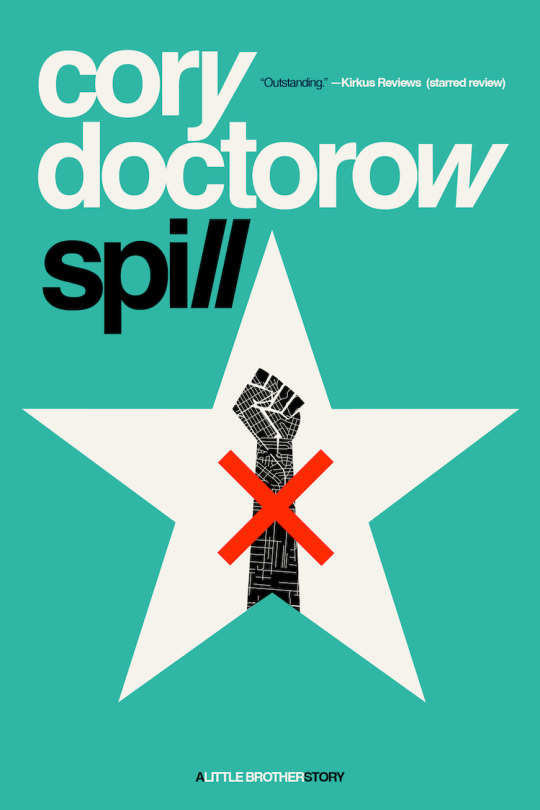

If you'd like an essay-formatted version of this post to read or share, here's a link to it on pluralistic.net, my surveillance-free, ad-free, tracker-free blog:
https://pluralistic.net/2024/09/25/epistemological-chaos/#incentives-matter

Image:
Ron Cogswell (modified)
https://en.wikipedia.org/wiki/File:George.Mason.University.Arlington.Campus.jpg
CC BY 2.0
https://creativecommons.org/licenses/by/2.0/
237 notes
·
View notes
Text

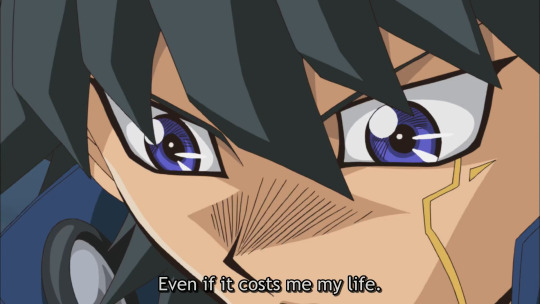


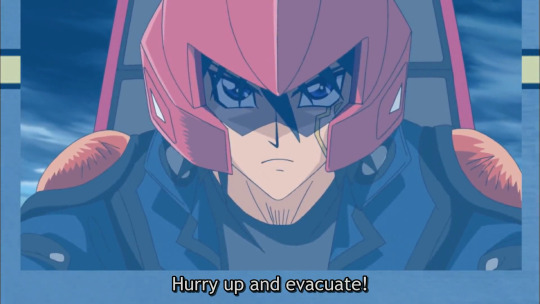
*cradles his face in my hands, kissing his forehead softly* You absolute IDIOT MY GOD YOU'RE A DISASTER
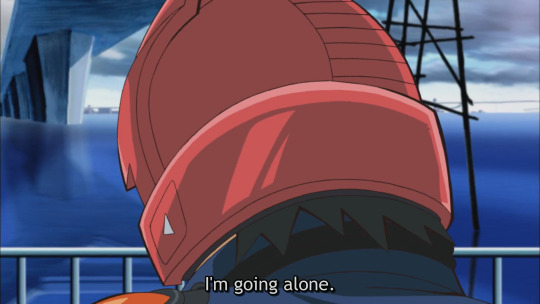
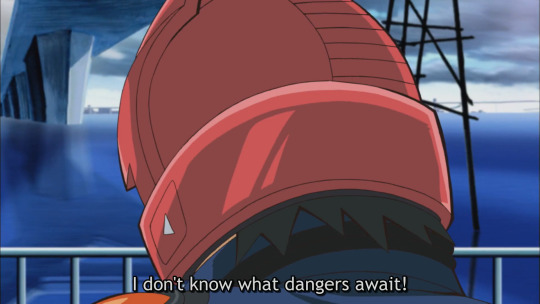
YOU UTTER BUFFOON YOUR FRIENDS CARE ABOUT YOU DAMN IT
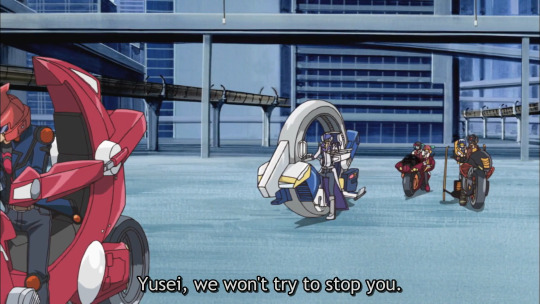
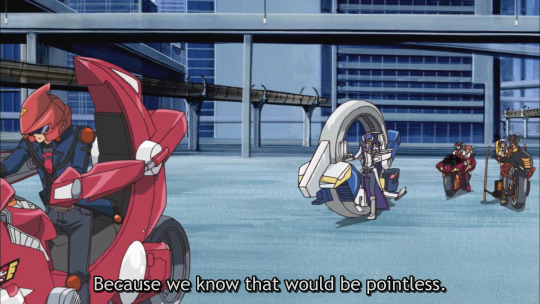
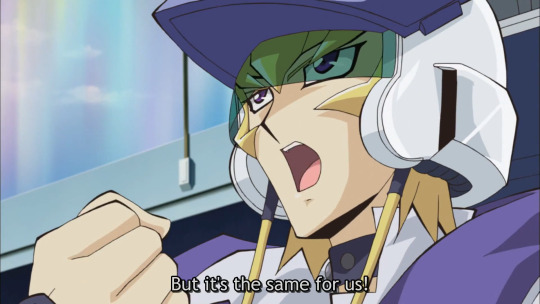
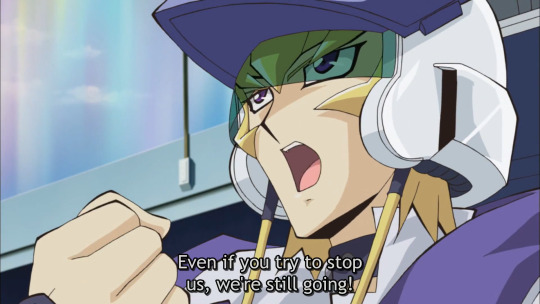

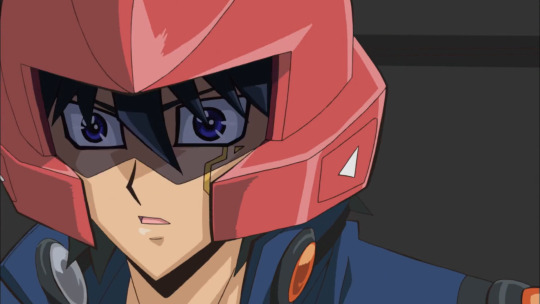

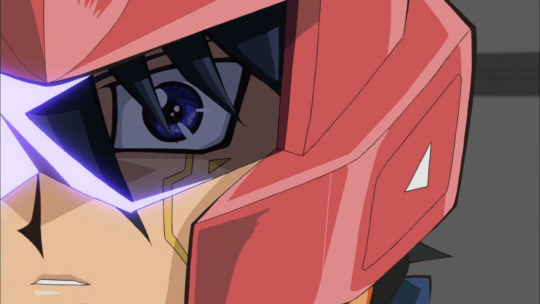
Surprised Pikachu Face
This guy, I swear.
#yugioh 5ds#yusei fudo#aki izayoi#akiza izinski#jack atlas#*bonks Yusei on the head*#this boy has So Many Issues!!!!#see this here?#this is yusei's fatal flaw#he fundamentally doesn't understand how important to people he is#worse yet you could extrapolate from that that he doesn't think he's important Period.#this guy is an absolute mess I love him so much#LEARN. THAT PEOPLE. CARE ABOUT YOU. DUMBASS!#I wanted to make this post yesterday already but ended up being so tired that I forgot#anyway#orchid rambles#orchid watches 5ds (again)#episode 138#screencaps
84 notes
·
View notes
Text
"What emerged in two interviews with Trump, and conversations with more than a dozen of his closest advisers and confidants, were the outlines of an imperial presidency that would reshape America and its role in the world. To carry out a deportation operation designed to remove more than 11 millions people from the country, Trump told me, he would be willing to build migrant detention camps and deploy the U.S. military, both at the border and inland. He would let red states monitor women's pregnancies and prosecute those who violate abortion bans. He would, at his personal discretion, withhold funds appropriated by Congress, according to top advisers. He would be willing to fire a U.S. Attorney who doesn't carry out his order to prosecute someone, breaking with a tradition of independent law enforcement that dates from America's founding. He is weighing pardons for every one of his supporters accused of attacking the U.S. Capitol on Jan. 6, 2021, more than 800 of whom have pleaded guilty or been convicted by a jury. He might not come to the aid of an attacked ally in Europe or Asia if he felt that country wasn't paying enough for its own defense. He would gut the U.S. civil service, deploy the National Guard to American cities as he sees fit, close the White House pandemic-preparedness office, and staff his Administration with acolytes who back his false assertion that the 2020 election was stolen."
-- "How Far Would He Go", TIME Magazine's interviews with Donald Trump, April 30, 2024.
I know we're saturated in coverage of Trump and it's easy (and probably better for our mental health) to usually ignore most of the articles when we see them, especially since he's so full of shit and infuriating. But it's also important to recognize that he is going to be the Republican nominee for President and he could absolutely be elected in November, and if you thought his first term was scary and dangerous, you need to understand that in a second term he's going to have people around him that are better prepared and VERY willing to do the crazy shit that he wants to do to this country. They aren't even hiding the fact that they are seeking vengeance against political opponents whom they feel have wronged them, and are ready to fundamentally dismantle the democratic foundations that are barely holding this country together after nearly 250 years.
Just look at what Trump says about the people who he incited to attack the United States Capitol in an attempt to overturn the results of the 2020 election and halt the peaceful transfer of power that has happened every four years since 1789:
"Trump has sought to recast an insurrectionist riot as an act of patriotism. 'I call them the J-6 patriots,' he say. When I ask whether he would consider pardoning every one of them, he says, 'Yes, absolutely.' As Trump faces dozens of felony charges, including for election interference, conspiracy to defraud the United States, willful retention of national-security secrets, and falsifying business records to conceal hush-money payments, he has tried to turn legal peril into a badge of honor."
Oh, and please note that Trump -- a former President of the United States and possible future President of the United States -- said on the record in these interviews with TIME: "There is a definite antiwhite feeling in the country and that can't be allowed either." We are at a point where political leaders are outright saying that in this country again, and it's because of Donald Trump.
So, take the time to recognize that Trump is straight-up telling us the country we're going to be living in if he wins again in November. And understand that your vote matters -- and WHO you vote for matters -- because, as I've been saying for years now, ELECTIONS HAVE FUCKING CONSEQUENCES.
#2024 Election#Politics#Donald Trump#President Trump#Trump Administration#Vote#ELECTIONS HAVE CONSEQUENCES#TIME Magazine
10K notes
·
View notes
Note
Do you have any recommendations for gaining access to these books? I have a pretty long list of ones I want to read but can't afford most of them. The library has the big ones (Whipping Girl, Detransition Baby, Nevada) but the newer or less well known ones have been difficult to find
No this is actually so real though. Let's talk about it.
One of the big problems that I'm trying to address here is the fact that there is a lack of ability for trans books to reach their perhaps core audience, trans people. Over the last few years trans librarians have been trying to increase the number of trans books in circulation, but that's super contingent on where you live. Not to mention the fact that, at least in the US, states are actively trying to criminalize circulating trans books in libraries.
I know Tumblr is allergic to economics a lot of the time, but you've gotta look at the math to understand why this is the current state of things. Essentially it's a vicious cycle. Lots of trans people can't afford to buy a $25 hardcover on a whim, and traditional publishers put a lot of stock into how well a book performs on release, cause that's how they make money. So when the core audience can't afford it and isn't marketable, they register that as a lower demand, which means that fewer trans books get published, fewer end up in libraries, and the cost of an individual book is driven higher. Low demand, high price. Then because the price is high, trans people cant afford the books, and the cycle continues.
It is the dilemma of the transfemme author that most of their core audience is also gonna be transfemme. It's a self-selecting process that's very hard to break out of. And at the end of the day, there just isn't very much money to go around in the trans community because trans people so frequently get cut off from generational wealth. So when you get an ecosystem of transfemmes selling books to other transfemmes who also sell books to them....
I took a class on the Sociology of Art a few years ago, and one of my core takeaways was that the boundaries of a field (yes my teacher liked Bourdieu, come for her ass, not mine) are fundamentally governed by institutions and entities with the money and power to dictate their rules of play. In Althusser's language, you would call those ISAs (Ideological State Apparatuses). When you read Weber, he talks about how culture needs to have some level of social legitimation in order to become a force of power in the world (I butchered that but it's the gist lol). And it's like.
The people who have the money to read the books dictate which books receive the money. Organizations like Lambda Literary, presses, big name publishers, etc. One of the big problems in the field of trans literature up to this point is that the only people who've had the money to produce social legitimation from the organizing schema/matrix of an ISA have also only chosen to read a very small slice of the extant literature. Then, because those non-profits and presses and companies only champion a small selection of books, that in turn dictates for those who have less money which of those books deserve social attention, critical acclaim, sales, library slots, etc.
And like, all of that is an illusion, but it produces a material reality for the transfemme author. It dictates the material conditions for the reproduction of said literature and who can participate in it.
So, what's to be done about it?
"Buzz" is a big deal in the publishing industry. A good review, an award, a thinkpiece - all of that can be the difference between a successful book and a flop. Publishers look for that. If nobody talks about a book and it doesn't sell well, they'll drop the author faster than you can say Susan. Again, vicious cycle. But like, at the end of the day, a "field," an "ISA," a "legitimated" work of art, that's all just a class prerogative. The different between a Very Important Literary Blog and a "person talking about books on the internet" is money. Like. It's just money. The reality of it is really banal.
It's who has the money to read books. It's who has the money and time to write about books. It's who has the money to gain institutional access to book. It's who has the money to read enough to say, "Oh, well that might seem true, but if you look at X, Y, and Z it's clearly not." It takes money to fact check. It takes money to challenge institutional myths. It takes money because when an institution makes a claim about a book and none of the people who care enough to argue with them have the cash to challenge it, the claim tends to stand.
And like, the honest truth is that between the books, the website, and the education, I've spent a lot of money bringing this website online in the form you're reading it in. A lot of the books I've read were really fucking expensive. I grew up in a wealthy family, my parents were accepting. They have both the means and the desire to support my passion projects. I'm lucky.
The goal of The Transfeminine Review is to create at least one independently trans-run website that can challenge that brand of institutional legitimation work from non-profits and big publishers and cis outlets, a website that can actually highlight transfeminine literature as it exists in the world, not as the Big 5 publishers have dictated it. Topside, Metonymy, Arsenal Pulp, LittlePuss, etc. They've all taken on that challenge from the angle of producing books, but there hasn't been a corollary trans secondary ecosystem dedicated to documenting and critiquing them. Or there is, but it's extremely diffuse and hard to find if you don't know exactly what you're looking for. Then there are the general queer outlets, like them. and whatnot, and they do their best but literature is a side hustle at best. There's the queer-helmed literary outlets like Electric Lit (shout out Denne Michele Norris) but they spend most of their time talking about cis authors. None of it is designed to help or review self-published literature from poor authors, and let's be frank, most transfeminine publishing is still done indie or self.
It's an investment, essentially. On the longshot, the hope is that this website will inspire others to do similar work, and that eventually through the collective efforts of trans authors and their readership, we can begin to change the math on trans publishing and help to spread it to a wider audience.
Now.
None of this changes the current reality that trans lit is expensive.
Unless you're lucky, you're probably not gonna find much trans lit at the local library even if you dig for it. Another good place to find free trans books is transreads.org, but their selection is mostly non-fiction, and the fiction is, again, largely the same few books you can find elsewhere. Another good online queer library is https://www.queerliberationlibrary.org/, which might be a good place to look (shoutout to Skye for bringing it to my attention!)
There are a couple of cheaper places to find trans books. If you shop around on itch.io, a lot of self-published trans authors have "name your price" models, which can be more accessible. Creators on itch will also bundle their work on a fairly regular basis, so you can get like 10-20 books for $10, which is, by my token, an excellent price.
If there's a particular author you're interested in, a lot of self-pub trans authors have Patreon accounts where they serialize their novels. You also can find serial (pre-edit) versions of a bunch of books on Scribblehub.
This has gotten steadily less affordable over the last few years cause Amazon is evil, but Kindle Unlimited ($11.99 a month, but there's a free trial) has thousands of trans books. Most of them are erotica, but like, there are a lot of hidden gems in there, and if you're a voracious enough reader, then it'll definitely be much cheaper per book than buying trad.
The problem with all of these, though, is that they tend to favor specific genres and tropes. Like there's only so much variety on itch.io or Scribblehub or transreads.org or KU. So if you like the genre conventions, then awesome! But if you don't it's probably not for you.
And none of it will give you access to some of the rare older tradpub books or the new but scarce releases that I've been going through unless you're willing to pay the full price for them.
I wish I had a better answer, but that's unfortunately the current state of the industry :/
Hopefully this ramble is helpful.
Beth
#trans fiction#trans literature#transfem#booklr#books#literature#literary criticism#transfeminism#publishing#self publishing#publishing industry#sociology#economics#basically the publishing industry is fucked and transfemmes get an especially short end of the stick
490 notes
·
View notes
Note
i have a question and sorry if it sounds incoherent. why is it so important to marxists to distinguish that marxism is not “moral” or “ideological”? i understand that marxism is grounded in historical materialism and that it aims to understand how existing structures and institutions function with the specific goal of abolishing them in favour of a marxist state, but when it comes to understanding how to move forward past capitalism, how can MLs claim that it’s entirely objective and scientific? isnt the fundamental purpose of marxism (abolishing the oppressor class and putting the proletariat in power) a subjective one, given that it to support that you need to believe that abolishing the oppressor class is desirable in the first place? how would ML “scientifically” help people decide where the line is drawn on subjects like the death penalty and incarceration if its committed by a communist party (given that the decision that the cost of killing/imprisoning people is worth the boon it would give in establishing a communist state is still based on subjective goals?)
i don't think modern marxists should claim they're not ideological. im sure some do, but imo the correct claim is marxism is not idealist. i think some of this confusion comes from a popperian view of science as "neutral" or "objective" outside of time. how the political economy affects the propagation of ideology and the process of science as practiced in reality is very standard marxist analysis now. some of the claim to objectivity is something that most people claim belongs to their favourite philosophical project see the rawlsian veil of ignorance in liberalism. marx is also writing in a world where theological and religious reasoning have a lot of primacy in philosophy and he is drawing a clean break from that by hewing to scientific characterisation of his methods.
idealism, in the kantian sense is a philosophy that argues that our ideals (about say, fairness, justice etc) inform how we organise society. marxism, as philosophical project develops in response to kant and hegel to argue that the political economic base, ie the productive relations of society actually inform superstructure of ideals. to quote marx in the preface to critique of political economy: "it is not the consciousness of men that determines their existence, but their social existence that determines their consciousness."
for clarity's sake the idea that changes in the mode of production (mostly due to technology) transform the relations of production which is the main driving force of history is historical materialism. the analysis of why existing structures and institutions must be abolished therefore has to be grounded in analysis where such structures are considered variously – unstable, internally contradictory etc. if you view historical materialism as true, your theory of change cannot be that you'll change the world because it is unfair (an idea.) you can view the world as unfair as a marxist and talk about it to propagate the necessity of your project but that doesn't actually give you a blueprint on how to change it.
capitalists are oppressors, but marxism doesn't view the problem in their oppressive or evil natures. capitalist economies demand even the most moral capitalist to exploit the proletariat. but! it is desirable to abolish there class relations not merely because they are unfair and exploitative but because these class relationships cause workers to develop class consciousness, recognise their power and abolish capitalism.
on your specific example, i don't think marxism can or should claim their are no moral dilemmas. historical materialism doesn't assert that there are no conflicting understandings of history. walter benjamin's theses on the philosophy of history is imo good reading here.
so i dont think your concern about why it's important for marxists to believe this makes sense, because this is what marxism is. if you don't find this convincing, you're not a marxist. you could be an anarchist, or a social democrat or a radical liberal.
275 notes
·
View notes
Text
You know what, the Voice of the Smitten actually has a point. Yes, he's certain the Princess is his soulmate no matter what she does or what she is, and he clearly doesn't actually know her that much on a personal level. Okay, I understand why it feels weird to you.
In the real world it would be so, for sure. But the in-game reality is very different from the real world. On a fundamental level.
Consider this. There's no one in it but you, the Princess, and some disembodied voice who is more often than not isn't very likable and sometimes straight up antagonistic. Oh, and there are also other disembodied voices, but they're just shards of you, so do they really count as other people? Not really.
So the Princess is basically the only one existing being rather than you.
And that... Reminds me of one of the lines the Shifting Mound has to say.

I personally think that the same logic works for the Smitten as well. Of course the only visible being with a physical form who isn't you is going to be important. Especially for a shard of the consciousness whose whole thing is about being in love with someone.
How would you survive without each other? How could you live in such loneliness, how could you live having no one but yourself?
Moreover! The voice of the Smitten proves to be correct in the end about the soulmates part. Even if the Smitten couldn't have known that and it was just his gut feeling. The Long Quiet and her are the gods that apparently used to be one. What is then, if not being literally made to complete each other? What is it then, if not being united together by fate? What is it then, if not being soulmates?
So... Make fun of him for being an oblivious lovestruck fool all you want, but. In a sense, he was right all along.
#stp#voice of the Smitten#I'm very tired of the bashing the Smitten gets#people.... you can't take a game about godlike entities' relationship literally#and he's just a little bit silly#is it really that big of a crime?#slay the princess
708 notes
·
View notes
Text
The live action writers hate Aang
I have given myself a lot of time to think about the live action, and reached the conclusion that the writers hate Aang. I dare you to read read this and tell me I'm wrong.
Let me start this by asking you a question? What's the most badass scene Aang has in the first season of the OG show? No matter what you answer is, I know for sure, that scene doesn't exist in the live action. Aang does absolutely nothing to prove the audience he is the right person to be the Avatar, he learns absolutely nothing throughout the show, he doesn't need to look into himself and change his way of thinking. Nothing. Most of the fundamental lessons Aang learns throughout the first season are gone.
The first mistake Aang does in the OG is staying at Kyoshi island too long, letting the attention go to his head, getting too comfortable. He realises he brought destruction to the island and tries to fix his mistakes by jumping onto the Unagi to help the village. That's how he learned the responsibly he holds as the Avatar and finds a unique way to help the village. Well that doesn't exist in the LA. Instead, Kyoshi takes over Aang's body to fight the whole fire nation for him. Aang, himself, does literally nothing.
The spirit world. In the OG show Aang is forced to face his Avatar duty for the first time by trying to save the village that's beeing attacked by Hei Bai. This is his first test as the Avatar and he fails. Not only that, he loses his friend. So Aang has to figure out himself how to get Sokka back from Hei Bai. He figures out who her bai is, himself, understands why Hei Bai is angry and gives him hope, the way Katara gave him hope. So we see that even though Aang failed at first, he kept trying and was smart and compassionate enough to realise what the problem is and solve it. This does not exist in the LA. Aang sees Hei bai in the spirit world, within a second realises who he is and just gives him the Acorn, without having to face him at all!
Another reason I'm convinced the writers hate Aang is the way all the avatars + Bumi treat Aang. Everyone is mad at him for disappearing for 100 years. And look, I get that, you can be mad at him if he ran away from his duties...but he never did! He went to clear his head on Appa and got caught in the storm. And if he hadn't run away he'd be dead, so why are you all so mad at him?! Bumi being mad at Aang could make sense, because in the OG show Aang did spend a significant amount on time of goofing around before he finds out about the comet. But here, it makes no sense! Bumi is mad for no reason. As soon as Aang got out go the ice he took his duty seriously, so please, make it make sense! And the show just glosses over the fact that if Aang hadn't run away he would be dead with the rest of the air benders. Instead of letting Aang feel guilty himself, which he does in the OG show, they just get these characters to hate on him, because they're incapable of making their characters have any emotional depth.
Aang doesn't learn water bending. At all. And there is no logical reason for that. I guess they thought it wasn't that important but please explain to me how you want to make Aang more serious and focused on the Avatar duties but not make him learn water bending? The literal next step Aang has to take to becoming the Avatar?? That is the only clear goal Aang has from the second episode of the show - to find a master and learn waterbending! Make it make sense!
Taking away Aang's talk with Koh. So I assume if most people didn't answer my question above with the Koi fish, they probably said Aang's journey into the spirit world and his meeting with Koh. In the OG show, Aang has to find a way to figure out how to save the water tribe. He does so by going into the spirit world and talking to Koh the face stealer. So Aang had to talk to Koh showing zero emotions so he doesn't have his face stolen. That scene is so creepy and so badass and shows that Aang is really capable, even though he is a kid, he is facing the creepy ass spirit and is doing an excellent job. So when Aang finds out who the moon and the ocean spirits are, it feels deserved, it feels like an accomplishment. In the live action he doesn't have to show zero emotions because Koh is not stealing faces, he's just stealing random people for whatever reason. Koh tells him exactly what to do, bring me a MacGuffin so I can release your friends, Aang just goes to see Roku, no problem, no obstacles to overcome, brings the Macguffin to Koh and he just releases his friends. Wow, really shows us how resourceful Aang is by making him...get an object and give it back to Koh...
And the very last point that I absolutely hated in the show. When Aang goes into the Avatar state and becomes the giant koi fish and wipes everyone out, the live action show goes out of its way to emphasise that that is not Aang in there. Aang is gone. The Koi fish is just rage. and that's that. Taking away ANY agency Aang ever had. Look, I know in the OG show Aang is not in control of the Avatar state either, but we know that's still Aang in there, that's his power he's showcasing. He might not be in control but that's him doing it all, being all powerful. But in the live action, they tell us Aang is gone, that's just his body the spirit is using. Plus Aang does no watebending himself, no gestures like the original where you can see aang in the sphere water bending, controlling the giant Koi fish, showing us how far he's come as a water bender. But in the LA he's just in the sphere...doing nothing because he never learned water bending so of course that's not him doing all this cool shit.
I am so angry over all of this. This is you MAIN PROTAGONIST. and you made him nothing but a vessel to progress the plot. You gave him no character, no growth, no struggles, no power! So no, you cannot convince me, at this point, that the writers of the live action don't hate Aang. Probably as much as they hate Katara.
#atla#avatar: the last airbender#aang#avatar#avatar the last airbender#natla#netflix#netflix atla#atla netflix#avatar aang
583 notes
·
View notes
Text
rotating jin guangyao and his problems
chewing up jin guangyao in my head... this is another one that's been in the drafts forever. throwing it out there because I'm out of gas.
the broad outlines of these thoughts are:
jin guangyao pursues AND values relationships with people he considers to be Good, particularly lan xichen and qin su
which. like. normal.
what's weird is that they're so good that he can't ever disclose the bad things he's done, because they are Good and they would be Disgusted and they might not Love Him anymore.
you'd think they would be safe because they are Good, but that's not how this works.
so he's fundamentally constructed these prisons where he can't get closer but also can't get away
ughhhh I can't articulate it but something something about how he's created these relationships which he fundamentally can't disclose certain important things, areas of violence or vulnerability, without losing them
sooooo they're kinda hollow!! they're hollow relationships!!
I think for lan xichen a lot of distance can be chalked up to the physical distance demanded by their respective responsibilities
like "we would be closer if we could"
so it's a distance that also allows for a continual mutual idealization and doesn't feel bad because there's an outside source
but for qin su? especially during and after rusong's assassination?
like—even setting aside the question of whether or not he killed the kid—they're having different emotional responses to his death because rusong, while he was alive, must have been a source of terrible ongoing anxiety for jin guangyao, who is deeply paranoid about any of his secrets coming to light.
so an ending to that kind of anxiety is a relief, even if he didn't kill his own child.
but relief mixed with grief presumably wouldn't match qin su's emotional experience of rusong's death.
so they're not emotionally in sync, and she doesn't understand why. her husband has also withdrawn from her in a number of ways (because of... the secret incest...)
idk it just seems emotionally horrifying
I also think this is partly why you get such a wide range of takes on jin guangyao, even from people who like him. because people who do this type of thing are sometimes doing it to manipulate people into staying with them, and if someone has done it to you, the tactics are very recognizable (such as during the confrontation between jin guangyao and qin su, where he's desperately trying to control the outcome of her finding out about the secret incest)
anyway what a guy! the inside of his head probably sounds like the soundtrack to a horror movie 100% of the time, huh
#be free jgy thoughts#jin guangyao#lan xichen#qin su#jin rusong#yaosu#xiyao#mdzs +#meta#least-carpet thoughts#that's your queue
269 notes
·
View notes
Note
”I can see the original intention [of the Jedi Order's no attachment rule] was to not be possessive or clingy. I take issue with the idea that a toddler's love for their caregivers falls there. It seems more like the people making that kind of demand are toxic.”
I'm guessing this is a reference to how the Jedi prefer not to provide training to those who've reached a certain age. Thoughts?
I mean. A toddler is generally considered a kid from the ages of 1 to 3 years old. The Jedi don't seem to have any issues taking in kids in that age range and, in fact, that seems to be the most NORMAL age range for when they adopt children. I don't know precisely where this information comes from, but my understanding was that the age cut-off for adoption was around 5 years old, which is two whole years beyond when a child would be considered a toddler. Anakin himself is NINE, now six years beyond being a toddler, when he's declared too old. So I think we've already got an issue with this statement given that, if we're specifically discussing the Jedi's policy about age cut-offs for adoption, they have zero issue with toddlers and specifically adopt toddlers BECAUSE there's less issues with adjustment to the Jedi lifestyle at that age.
But if we set that weirdness aside and pretend that they just meant any child's love for their parent regardless of how old said child is, I still think there's a fundamental misunderstanding of the issue here. It's not that the child's love for their caregivers (presumably their biological parents most of the time) is automatically already an attachment and that's why the Jedi won't take in kids older than a certain age. The problem is that the child, once they've reached a certain age, is going to struggle a little bit more with that separation because that connection becomes really important once you've made it. It's not impossible, obviously, just harder. It could cause the child some pain upon separation and the Jedi then have to consider whether the child will benefit enough from Jedi training to make that pain worthwhile in the long run. The other issue is that the child likely has started to learn certain things that don't work very well with the Jedi way of life and so the child is then going to have to UNLEARN those things. Again, not an impossible task, it just makes the path to becoming a Jedi more difficult for an older child than for one who was raised as a Jedi from a younger age and never had to unlearn anything first.
The question the Jedi tend to face when they have to choose whether to adopt older children or not is whether the child is going to actually be happy as a Jedi or not, and whether the child might in fact be happier in a life more similar to the one they're already familiar with. They have to consider whether this child might be happier staying with the family they've already connected to and whether the separation from that family is going to be more distressing for the child than the rejection. Being a Jedi is not at all an easy path. It can be a really rewarding and satisfying path, obviously, and plenty of Jedi seem very happy in the life they've chosen, but that doesn't make it easy. So if it seems like the child in question isn't really going to find any happiness as a Jedi because of a prior connection to a caregiver or because the behaviors and worldviews they've already learned are incompatible with the Jedi lifestyle, it doesn't make a lot of sense to try to force them down that path anyway. It's just going to make everyone unhappy.
And this is where the attachment things come in to play because if that child DOES end up becoming a Jedi anyway, those struggles probably just mean it's a little more likely that the child will struggle with attachment down the line than a Jedi child brought in earlier might.
So it's not that the Jedi think the child's love is CURRENTLY an attachment so much as they have to consider whether the child's connection to another caregiver is going to cause them enough distress when they're separated that it could create greater issues with attachment later on than the child would have had otherwise.
And this is why I personally don't think Anakin would've ever been happy as a Jedi, even in a world where Palpatine gets murdered during TPM and Anakin never gets manipulated against the Jedi. I think the separation from his mother is something he struggles with and that there are signs that Anakin has already learned behaviors that are going to make the Jedi lifestyle difficult for him in a way that it isn't for someone like Obi-Wan or Ahsoka. I think Anakin is always going to want a specific kind of relationship that the Jedi simply do not provide, and while I think he wants to help people, he also wants to help them in his own way (when and where and how he wants) and chafes at the limitations the Jedi work with. Anakin's upbringing means that the Jedi way of life is never TRULY going to work for him in the long run. If he'd been found as a toddler, he would've probably been fine, but he wasn't.
I'm not sure what kind of "demand" this person is referencing, I assume the idea is that the Jedi demand that the child give up all connection to their original families/caregivers or something, which isn't even precisely canon. There's a pair of twins in TCW. Both Depa and Adi have family members in the Order that show up in the films. In Legends, Plo Koon has a niece in the Order. And we see multiple Jedi engaging in the culture of their birth planet in different ways (clothing, tattoos, alternate religious connections), so it doesn't really make sense that the Jedi would allow that but not allow their members to reconnect with their birth families if they chose to. Even with Anakin, there's no actual indication that he wasn't ALLOWED to see Shmi or try to contact her at all. He never indicates that that's why he hasn't gone back, Obi-Wan never tells him anything like that when the subject is brought up. The only reason it's kind-of an issue later in AOTC is because he's actively abandoning a mission he's already on in order to go see her. There isn't even any particularly negative reaction from the Council when they discover he's on Tatooine nor any indication he was ever disciplined for that. Which leaves one conclusion: If Anakin didn't go see his mother, then it's because he CHOSE not to go see his mother, not because the Jedi demanded it.
If the "demand" is that the Jedi just simply not show love to anybody, then I think enough people have discussed how that just plain isn't true and doesn't make any sense, so I won't get into that.
I don't think it's toxic for the Jedi to recognize that older children have a more difficult time adapting to their lifestyle and that this can lead to further pain and issues in the long run. I don't think it's toxic for the Jedi to be able to recognize the signs that an older child is not ready to adapt to the Jedi way of life and refuse to adopt them into it. I don't think it's toxic for the Jedi to understand that a little bit of pain from the rejection in the moment could spare the child a lot of pain in the future.
Our best example of this is, obviously, Anakin himself. The Council are 100% RIGHT about Anakin. While Palpatine obviously does manipulate Anakin away from Jedi teachings to some degree, he's also primarily just exacerbating issues that Anakin already has. Anakin struggles his entire life as a Jedi with attachments to people (he obsesses over Padme for TEN YEARS despite not seeing her once in that time). Anakin struggles with respecting the Council's authority for his entire life as a Jedi and literally passes on that disrespect to his own Padawan almost immediately. Anakin admits to believing his personal feelings are more important than his ideals when speaking to Padme and the way he speaks to Obi-Wan during the reveal of his history with Satine implies the same feeling. Anakin explicitly chooses to live a secret double life because he wants things that the Jedi lifestyle simply does not offer him and does not allow. Anakin has either discussed wanting to leave the Order with his own Padawan, or he's just so obviously about wanting to leave the Order that his own Padawan has picked up on it without him having to say it out loud (and if Ahsoka's picked up on it in the like... year and a half that she's known him, then you can be damn sure that Obi-Wan is aware of it and so are Yoda and Mace probably). Anakin struggles with being a Jedi THE ENTIRE TIME HE IS ONE and barely even wants to be a Jedi most of the time. The Jedi's lifestyle is a bad match for him and the struggle to adjust to it as well as the separation from his mother causes him pain for the rest of his life.
My personal theory for why the Council ultimately took him in despite their reservations is because the return of the Sith got confirmed and so protecting Anakin as a Force sensitive child became a priority. Training him as a Jedi would've seemed like the best way to protect him, and Anakin did risk his life to help save the people of Naboo, so it's not like he has none of the qualities it takes to be a Jedi and they choose to take a chance on him. Just because that choice goes badly doesn't necessarily mean it was the wrong one to make in the moment, either. Much like many of the choices the Jedi are forced into making in the Prequels, all available choices kind-of stink and they have to do the best they have with the information they've got in front of them.
All of that to say, the Jedi aren't arguing that a child's love for their caregiver is toxic and selfish, that's not the reason they tend to refuse to adopt children over a certain age.
232 notes
·
View notes
Text
PSA: Mana doesn't exist in Dungeon Meshi
Some translations of Dungeon Meshi (specifically the English anime and Yen Press manga) have used the word mana to describe magic, when the original Japanese simply said magic (mahou, 魔法) or magical power (maryoku, 魔力).
Ryoko Kui does not appear to use the word mana (マナ) at any point in the manga, the published extra materials, or her blog, so calling magic “mana” is an addition made only in some translations.
For example, the French translation does not use "mana." If you know of other translations that do or don't use mana, let me know!
The use of the word mana in English comes from Maori and its earlier Proto-Oceanic ancestor language.
It describes a form of supernatural power tied to social status, respect and strength. Mana is a religious concept for many Austronesian cultures, and is not really "magic" in the way pop culture has defined it.
As best as I can understand it from an outsider's perspective, mana is more like attributing a supernatural quality to a person's charisma, or the awe one feels when faced with a natural wonder like a mountain or the ocean, or the intimidation one feels when facing a powerful group.
The use of the word mana as a generic term to refer to magical power has been criticized as being cultural appropriation of a real religious term, still used by living people, to describe fictional magic.
In addition to this, using an Austronesian word at random in Dungeon Meshi for one of the most important and fundamental forces of the universe (magic) is inorganic to the world that Kui has constructed, which is rooted primarily in Greco-Roman, Hindu/Buddhist Indian, Middle Eastern, and Germanic cultures.
Using mana to refer to magic would suggest that the Ancient culture from before the cataclysm was Austronesian, but the rest of the manga does not support such an idea at all.
There are references to Austronesian and Oceanic cultures in Dungeon Meshi, but they are mostly tied to the orcs, who don't appear to use magic, and whose culture clearly doesn't, and has never had, the social power to define what word the rest of the world uses to refer to "magical power."
How did a Maori word get so popular in English?
The concept of mana was introduced in Europe by missionary Robert Henry Codrington in 1891 after he wrote a book about his time in Polynesia. The concept was then popularized further in America in the 1950s by Mircea Eliade, an extremely influential religious history scholar at the University of Chicago.
Mana was first introduced as a magical fuel used to cast spells in the 1969 short story, "Not Long Before the End", by Larry Niven. Around this time it also became popular with new-age religious groups.
It has since become a common staple in fantasy fiction and games.
So why translate it as mana?
The choice to translate "magic" and "magical power" as mana was probably made to try and make Dungeon Meshi sound more like a video game/RPG, since so many Japanese fantasy manga feature video game or RPG mechanics, and translators working on Dungeon Meshi would have no reason to assume it would be any different, especially at the very start of the manga.
However, Dungeon Meshi is much closer to High/Epic Fantasy, like Lord of the Rings, and throwing random gaming terminology into the translation when it wasn't in the original text ("mana", "newbs" and "inventory" instead of "magical power", "newcomers" and "supplies") feels out of place.
I think adding the term mana is a disservice to the hard work that Kui has done with her careful attention to linguistic detail and culture.
In the process of working on my Dungeon Meshi research paper on real world cultural references, I have studied over 100 names and words used by Kui, and I have found that she is remarkably thoughtful and consistent in what real world cultures and languages she pulls from, and what fictional cultures she pairs them with.
Obviously I don't blame the translators for not knowing this, they had to make translation decisions before the entire manga was complete, and most likely they were doing work for hire, with no idea what Dungeon Meshi was about.
They had no way of knowing Dungeon Meshi wasn't a video game fantasy comic, and were just trying to rush through their work as fast as possible in order to get paid, and move onto their next project.
Once it became apparent that Dungeon Meshi was High Fantasy and not a world that functions like a video game, they'd already used the word mana, so there was no going back.
In an ideal world, if the translators had known the type of story Dungeon Meshi would become from the beginning, if they really wanted a single word to translate "magical energy" into, they could have picked a word that belongs to one of the language families I mentioned before, rather than using mana just because "everybody uses mana, so readers will know what it means."
What should I call magic power then?
If reading all of this has made you want to stop calling it mana, hooray! Thanks for listening to me rant. You could just call it magical power, if you wanted. Nothing wrong with that!
But if you want something a little less clunky, here's an incomplete list of possibilities in some of the languages most commonly referenced in Dungeon Meshi. Please note I have not done due diligence on every one of these, I believe none of them are exclusively religious terms still in use, but just words that could mean magic (both fictional and real) in various languages. If I'm wrong about any of them, let me know.
INDIAN: Maya, prana.
MIDDLE EASTERN: Sihr, kiisum/kesem.
GRECO-ROMAN: Ergon (as a euphemism), goteia, physis, numen/numina, mageia.
GERMANIC: Seidr, galdr.
(This post is an excerpt from my Dungeon Meshi essay with additional elaborations.)
287 notes
·
View notes
Text
It really tires me how some fans try to make Aegon look like an asshole who doesn't give a shit about anything. This is a fundamental misunderstanding of his character as such. Of course he cares, that's literally the essence of his personality. He cares. He and Aemond both feel too much emotion, but if Aemond sublimates into self–improvement, trying to be strong, cold and detached, then Aegon is literally an open wound. I want to talk about this, also using Tom's interviews (yes, I think the actor's opinion is valid in this matter) and the few scenes that we have in the first season.
We know that Aegon didn't want the throne and wasn't ready to rule. The scene with Alicent, who explains to him the prospects for the future of their family, seems very traumatic to me. Imagine what it's like to know from your childhood that the lives of people close to you depend on you, on how strong you'll be. Such a burden can destroy anyone. You can't just ignore it.
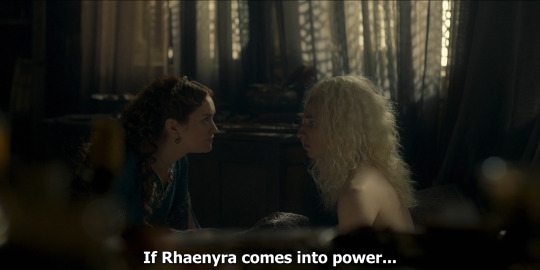
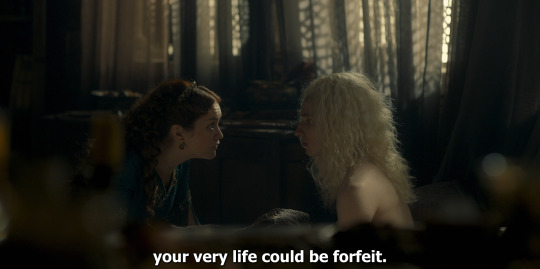
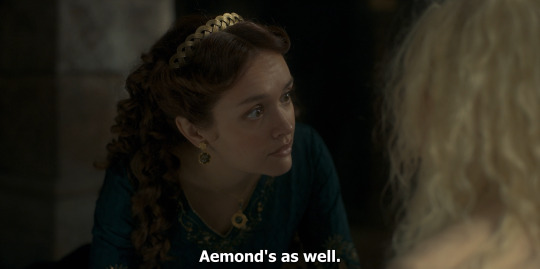
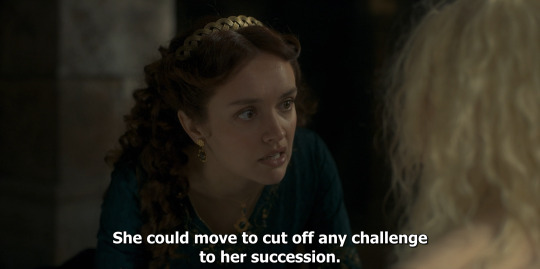
Next, we're shown how Aegon drinks on Driftmark. And that's a pretty sad sight - several cups in a row, wincing, as if taking a medicine that will help him to feel better.
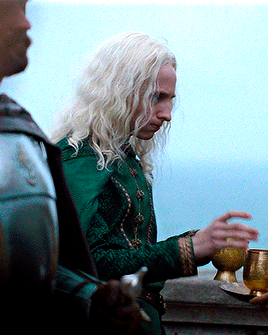
Actually, I like the theory that he gets drunk after Aemond says that Helaena is his future queen. Another reminder that he'll have to marry his own sister, for whom he has no feelings. And he drinks because he tries to numb his pain.
The same goes for his obviously unhealthy attitude towards sex - he uses it to numb his loneliness. I believe that Aegon literally didn't have the opportunity to feel what love is in any form. His father disliked him and showed it openly. His mother loved him, but she never knew how to express it the way he needed to. He was married to his sister (the tragedy for both of them) and it was a matter of duty, not feelings. At the time of the first season, Aegon is deeply unhappy and this is obvious. I have every reason to believe that his need for physical intimacy is based on the fact that this is the only form of love he can receive. Considering that Aegon is quite smart, I even think that he himself understands how ugly this form is, but there's nothing he can do. During the act, I guess in some unhealthy way it really saves him from loneliness, longing and the need to be loved, but in the end it makes him even more unhappy.
Then it's impossible not to remember the eighth episode and the famous:
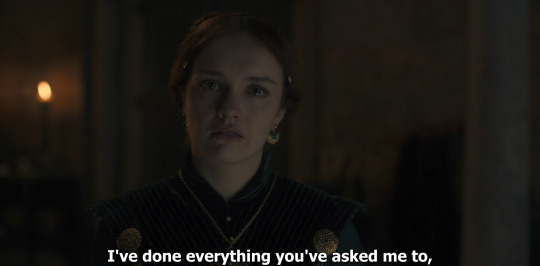
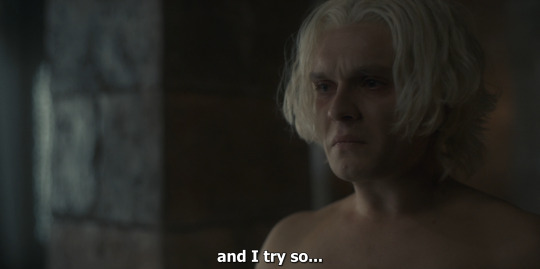
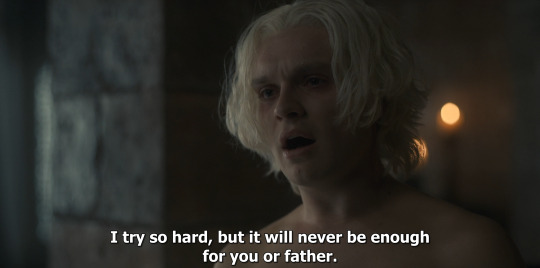
It's still clear that family is important to him. Yes, he feels like a stranger among his relatives, but it hurts him just because he cares. He cries and says "it will never be enough for you or father" because he wants it to be enough. He still loves them and wants them to love him back.
"What Aegon wants more than anything is to be told by his dad ‘I have faith in your capabilities as a young man. I see you bringing prosperity to King’s Landing.’ But he hasn’t said any of those things. His dad has completely ignored him, in fact, throughout his entire youth." (с) Tom Glynn-Carney for Esquire
Next, we can move on to episode nine and the fact that Aegon ran away. I've seen a lot of opinions that this is an indicator of selfishness and like...what? He was scared. This follows from the script:
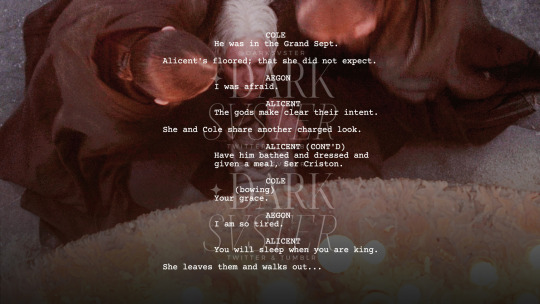
He was scared, he'd never leave his family, much less Sunfyre. It was a decision made in a panic when he realized that his father had died and the moment he had feared all his life had come - he needed to accept the crown to protect his family.
During the conversation in the carriage, we see that Aegon was really hurt that his father didn't love him:
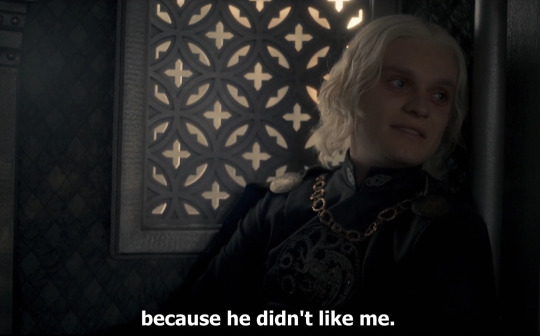
He even said "because he didn't like me" when talking about his father's attitude towards him. He didn't use the word "love" because it was obvious to him that his father didn't love him. He used the word "like", unknowingly emphasizing that he couldn't count on even simple sympathy.
He's also well aware that Viserys could have named him the heir, but didn't do so simply because he didn't want to and because of this, he - the eldest son, feels unworthy of the throne, and also completely lost.
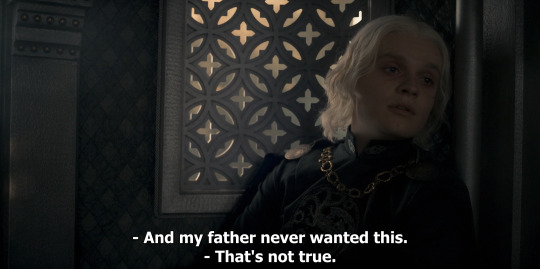
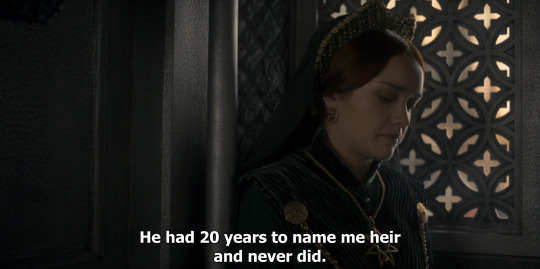
When Alicent tells him that Viserys wanted to make him the heir before his death, an emotional dam breaks inside him, it's literally written in the script:
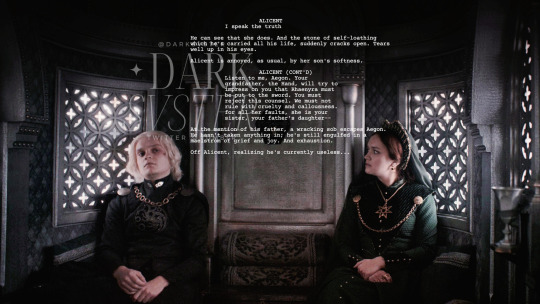
And at this moment, looking at the dagger, he's not even listening to Alicent, he's completely in his thoughts - maybe, at least for a second, his father cared about him. And when he asks his mother if she loves him, we see how much he craves love, how broken he really is, how important his family is to him.
I know this post is insanely long and I haven't even analyzed the various microexpressions in Tom's acting, but I'm really tired of people wanting to make Aegon something pure evil.
"I also see Aegon as being incredibly complex. He's not an out-and-out psychopath. I see a multilayered character that just has endless potential of pits of vulnerability and empathy and things that we don't see. I think it's his vulnerability that breeds the darkness. It's the way he copes, it's his security, it's his safety blanket, it's an addictive coping mechanism for him to shut things out and to be cold." (с) Tom Glynn-Carney for Entertainment Weekly
#aegon targaryen#aegon ii targaryen#tom glynn carney#house of the dragon#hotd#team green#pro team green#THIS POST ATE MY SOUL#opinion
397 notes
·
View notes
Text
I swear to god if I read one more "Messmer/Marika did nothing wrong" post I'm gonna fucking lose it.
Guys, Gals, Nonbinary Pals etc.
Be fucking serious.
it's somewhat obvious that Marika's people's oppression, and the subsequent domination of the social order was inspired by christianity's oppression and then rise to power within the roman empire- going on to be the dominant religious order which, in turn, persecutes religious minorities. Like. that's only just subtext by tooth and nail. It does not at all justify either religious regime's atrocities. It is Exceedingly obvious the game expects you to understand that, to quote Leda "They [the hornsent] were never saints, they were just on the losing side of a war". this line, alongside the black knight helmet, and the crusade insignia Expects us to understand that maybe the whole "Marika ordering a crusade to genocide a people in the name of revenge" is wrong, actually.
As for Messmer, he is indeed a victim of Marika, like most of the demigods. it's just that he's also (arguably Firstly) a willing collaborator in these atrocities, he's not an innocent uwu snake sadboy.
If we are forced to compel a singular unnuanced 1 dimensional archetype onto Messmer, the game expects us to understand that it's "Demon King". he's doing Authurian Romance Villain shit as filtered through the lens of dark fantasy. it's not a coincidence that most of the information about him comes from other people about how much he's personally destroyed their lives. He lives in a castle called the "Shadow Keep" for god's sake, his soldiers torment the people and we, adventuring wanderers and followers of grace/Miquella fight and defeat him, which, were this a traditional story ultimately lets us access Enir-ilim and fix things. That were this a tradiitonal story, then defeating the "Demon King" sets the land back to right by enshrining the True, Good King (or god, such as Miquella is, in this case).
The fact it doesn't is the complication to this otherwise simple story- the fact that Messmer is also a victim of Marika's pursuit of revenge is important nuance, and adds to the tragedy of this story- simply killing The Bad Guy In Charge doesn't fundamentally fix things. It's that complication that makes them so deeply fixating as people. But there is a mountain of difference between "I find Messmer's tragedy Sympathetic and Compelling (and thus want to fuck him)" and "Messmer did nothing wrong". You do not get the title "The Impaler" by being innocent.
you are, in fact, allowed to be horny for the snakeboi or for Marika without actively ignoring the realities of their casual brutality. Actively making a pair of complicated, messy, tragic characters into something simple and easily digestible for maximising fuckability is not a sign of like, actually liking them. Love your genocidal warmongers as they brutally murder civilians or like, admit you don't actually like them, you like the flanderised imaginary version of them- an attraction no more substantive than the kind of R34 art that gives Ranni tits and hips broad enough to change her aspect ratio, instead of her cool weird fucked up doll body. You Cowards.
#elden ring#sote spoilers#shadow of the erdtree spoilers#shadow of the erdtree#messmer the impaler#queen marika#marika the eternal#Vale said- kicking several hundred hornet nests with that last paragraph lmao.#i'm so fucked hahaha
268 notes
·
View notes
Note
i would like to ask ur opinion on this bc u are one of maybe 5-6 iwtv blogs that i trust and i don't know if i am simply biased but i think u are very thoughtful and fair in ur analysis of iwtv. because even among self-proclaimed louis lovers/understanders, i have seen the idea that louis "could not and would not" save claudia from the fire, or choose her over armand, or that louis was also abusive to claudia if not the Most abusive, or that he "let" lestat/armand destroy her. and i agree that louis failed claudia in some ways (though saying that feels much too vague at this point) and that liking characters doesn't mean apologizing for their flaws and i understand the reflex to spotlight claudia's mistreatment as many fans are so quick to dismiss her importance. but i think people get so caught up in emphasizing claudia's tragedy that they end up falling into victim-blaming rhetoric and ironically de-legitimizing really important aspects of her character and impact. so i wanted to ask though, how do you think louis actually did fail claudia? and should we call claudia's death louis' failure?
ty for valuing my opinion 🥹 i agree w you completely people emphasize claudia's tragedy at total expense of her personality...which sucks bc i love her personality...i think louis actually primarily failed claudia in the exact way that every single parent fails their child. if you've read frankenstein it's about the inherent monstrosity of creation--inherent hubris of creating something whether it's a creature, a work of art (the novel itself!), or a child (shelley's miscarriages and her relationship with her parents haunt the novel). you create something that is a part of you and a mirror of you, you confer your expectations as naturally as breathing, even with the best of intentions, but now the creature/novel/child exists outside of you, outside of your body and your imagination, autonomous, with desires and effects you couldn't have dreamt of, and there is something terrifying and painful in that chasm even in the best of conditions. and this is more broadly true of loving anyone. and in that sense i don't think louis's turning of claudia is really more selfish than having a child ever is. it's not an aberrant or evil desire. so that's one layer.
and then the next layer is the conditions. louis cannot stop seeing claudia as his daughter, even if he calls her sister. she'll always be his daughter. and again this is an almost fundamental condition of being a parent. even if ur parents make an effort--and louis is making an effort--to see you as equals, that foundation is underlying it and can't come undone. the problem is that normally, even if maybe you're always a baby to your mom deep down, you're also functionally an adult in the real world. but claudia is an adult who is constantly belittled and condescended to and treated as a child from all corners. so she goes from louis who can't see her as her own person because he cant stop being her parent to an outside world that can't see her as her own person bc it's structured to deny children's autonomy, and girls' in particular, and especially black girls'. AND THEN the abuse. “you chose lestat over her again and again” i think people take daniel as word of god a lot even when the show has demonstrated that daniel is less than careful talking and thinking about abuse, when it comes to both louis and claudia. Louis chooses to take lestat back, can’t kill him for good, chooses to commit to armand, tells her to put up with the coven’s abuse. those are choices that hurt claudia terribly. but they also exist in the context of abuse. over two decades of debilitating destroying violence and then a new man who tracks him down and dangles his and claudia’s life over him as penalty from the jump. louis is constantly calculating risk based on what they’ve experienced and the same way claudia’s trauma drives her into the waiting arms of a cult, louis’s means he sees enduring as his strongest means of survival . and even from before that from keeping his family afloat under jim crow —performance, self sacrifice at the expense of closeness with grace and paul; using “weakness to rise”. so when louis tells claudia to endure its bc he cannot imagine a way out. which is a failure sure and something claudia can and does resent him deeply for but is entirely and categorically different from what lestat and armand inflict on her . his “choosing armand” is never really about him liking armand particularly it’s him deciding he knows what’s best for both of them—again seeing claudia as his child—to the extent that he won’t even tell her about armand knowing their secret.
this isn’t selfless it’s foolish it’s prideful but the story very clearly is not Louis picking a man over his daughter. (claudia calls out what he wants in a companion in 2.01—“if he can’t call you pretty and take you ballroom dancing” Armand won’t even light his cigarette). i think people have constructed this narrative which funnily enough is the exact same one armand uses to gaslight louis with in 2.05 ("you threw around her name for cover, but you always went back to talking about him" or something like that). Which is really obviously a victim blaming narrative lol like the amount of joke posts that r essentially saying Maybe if louis wasn’t so cock hungry his daughter wouldn’t be dead. Okay?? i think its absolutely fucking insane to call her death louis's particular failure when she was lynched. by armand
and you can tell by episode 6 claudia has realized louis isn’t picking armand over her. her frustration with him is with this martyrdom that she never asked for or wanted, that clearly isn’t “you and me” either. Like you cannot tell me she believes “imagine me without the burden of her” means louis is happy and relieved to see her go Bc she’s not stupid and she’s seen him happy before. If she really thought he meant something like that she wouldn’t behave towards him as she does in the rest of ep 6 and doing the trial. completely ignoring her personality
there is also a hopefully really small subset of people who think pointing out how patriarchy works Is gender essentialism who posit louis as the primary perpetrator of misogynoir in order to justify their fundamental queer human right to call lestat femme . and then expect pats on the back for acknowledging #intersectionality . which is. absurd.
163 notes
·
View notes
Text

The fundamental misunderstanding between Maya and Taichi comes down to this. Maya has spent en entire life being told to just keep trying harder and harder and that every bit of it is on her shoulders and Taichi approaches her differently and what she sees in him is every other person that's been telling her those things and not the young man he is, the one who tells her to stop working so hard and to make other people work harder instead and she doesn't know what to do with that.
Taichi truly doesn't feel sorry for her. He truly believes that other people need to work harder and not just Maya. But no one has ever said that to Maya. Everyone just told her to work harder, to push herself harder, to be better even when better meant literally covering up her disability and pretending to understand.
Maya expects people to feel sorry for her, to look down on her, to not care that she can't hear and to belittle her disability and her ability. And Taichi's stubborn and straightforward approach didn't get her that but also didn't speak to the other side, to the people telling her that she could do anything.
Taichi's truth is not what Maya is ready to hear but it's important for her to know it's there and it was this episode that finally showed her what he truly meant, that proved to her that she couldn't keep willfully misunderstanding him to protect herself.
Maya has been protecting herself for a very long time. She's been pushing people away for a long time. Having someone see you differently can be scary when you're used to one way of being seen and you've decided that's how you want to be seen.
#i hear the sunspot#hidamari ga kikoeru#bl drama#bl series#asianlgbtqdramas#asian lgbtq dramas#japanese bl drama#japanese bl series#japanese bl#jbl
120 notes
·
View notes
Text
See, but there's something about the first fight in episode 1 that just doesn't really. fit. It very much feels like we are missing information here.
I have been thinking about this show all day, as one does, but in particular why Crowley gets angry enough to shoot literal lightning at a nearby building. We have experienced him upset before, but never to that specific degree, and their disagreement over Gabriel just does not explain it for me.
My hypothesis: a big, important fight happened right before season 2 picks up that left Crowley feeling rejected and Aziraphale neglected.
The biggest clue is the snippet of conversation about myself vs. ourselves.
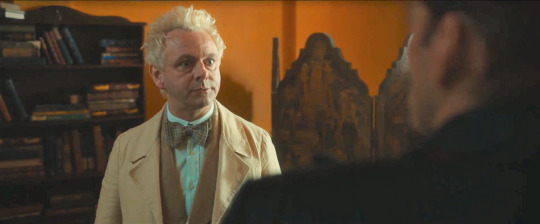
"I thought we had carved it out for ourselves"
He almost sounds offended when he says that, yet Crowley reacts with equal parts hurt and anger, like he is referencing something that we, the viewer, do not have any knowledge of.
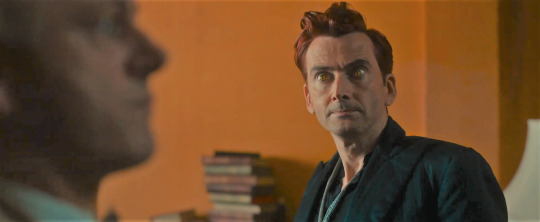
"So did I"
However, Aziraphale seems to understand whatever Crowley is referring to and does not respond with anything in return. Yet whatever wound they just opened keeps bleeding, and when Aziraphale tells him, packaged nicely, to fuck off, Crowley seems more sad than upset to me.
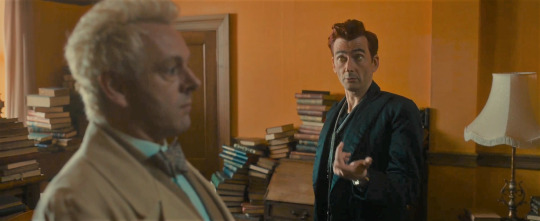
The to go? is almost said softly and with an initial confusion that hides a LOT of unspoken pain. Plus the HAND MOTION? The gesturing between the two of them while saying "oh, so this is how you wanna do this?" - call me insane, but to me that very much sounds like "oh so this is how you want to break up?"
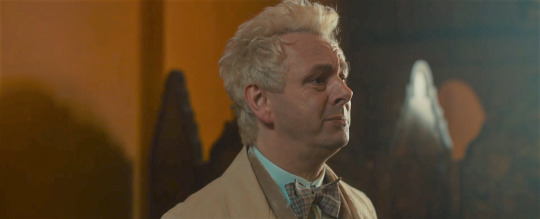
The funny part is, if Aziraphale had simply shut up after saying "I want you to help me take care of him", I can GUARANTEE YOU that Crowley would have begrudgingly agreed. But he doesn't. He keeps going and this is the first moment this season where he is genuinely and truly bitchy.
"But if you won't, you won't" with the demonstrative sit-down and turning away from him, eyes forward. It pokes at whatever wound is still open and bleeding between them. Aziraphale wants Crowley to jump over his shadow and come help him, ignoring his boundaries. Meanwhile Crowley feels fundamentally misunderstood and rejected and wants Aziraphale to SHOW that he cares about Crowley more than he cares about fucking Gabriel of all people.
That he cares about them more than about heaven.
And now we have finally reached Crowley's breaking-point. he is so deeply hurt by what Aziraphale just said and did, choosing heaven over them, that the pain turns into anger because he has no other way of expressing or feeling it in the first place.
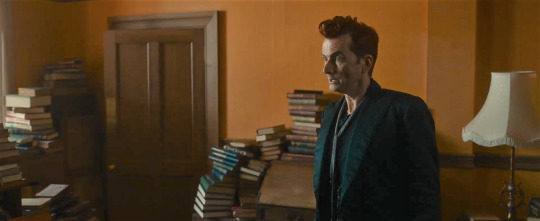
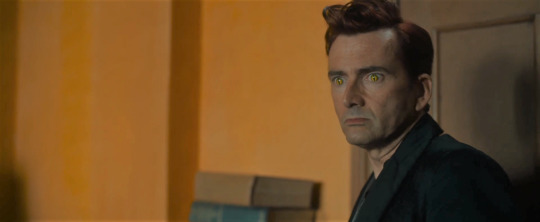
You're on your own with this one.
That last look is filled with such disappointed heartbreak, he turns around simply to give Aziraphale a chance to ask him to stay, to apologize, something. Yet again, he does not. He doesn't even meet his gaze, he is looking away.
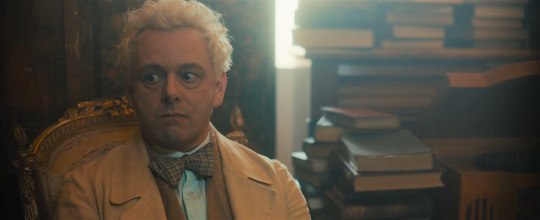
To me, he seems almost spiteful, like this entire argument is only superficially about Gabriel but about something entirely else deeper down.
Which - that's the point, isn't it?
Crowley comes back and apologizes because Aziraphale matters more to him than stupid arguments or choosing sides, keeping him safe is the only thing he cares about when it comes down to it. He swallows down his hurt and betrayal and does what Aziraphale wants: ignoring the entire argument and pretending nothing ever happened so they can continue like before.
Only that they can't. The entire season shows just how much they cannot go back to their arrangement, no matter how hard Crowley tries to mold himself to Aziraphale's will. Their final argument simply reflects all of that and more. The same wound that first one was about gets reopened very violently and they're bleeding all over each other with no way to stop it because they're too fucking stubborn to admit that it exists in the first place.
Aziraphale and Crowley can only fix their relationship when they acknowledge the reason the rift between them opened up. Until then, Crowley feels truly rejected and Aziraphale feels entirely neglected, and there is nothing anyone can do to make them confront that.
#alex talks good omens#good omens#ineffable husbands#crowley#aziraphale#good omens season 2#good omens meta#aziracrow#crowly x aziraphale#go2#literally there HAS to have been an argument between the seasons#something caused them to be like this in the first place#this didnt come out of nowhere and it wasn't completely slow either#there was a fight and they both know when they reference it but never actually talk about it#ineffable husbands more like ineffable IDIOTS
656 notes
·
View notes
Text
Jinx's haircut: how Powder and Ekko's story comes full circle
Hi! So, it appears Jinx will be cutting her hair short in season 2 (which is cool as fuck), and I’ve been seeing a lot of discussion on it, so I wanted to share my two cents 😊
I might refer to Jinx and Powder as if they are different ideantities, but I'm aware that's not how that works; it's just an easier way to express myself. Also english isn't my first language, so apologies for any possible wiritng mistake (this is a bit of a mess 😅)
* deep breath in *
As it has already been pointed out, this choice must have a deeper reason other than esthetic (I've been seeing the phrase "hair holds memories" used a lot), and what's even more interesting is that her new look resembles a lot how she used to look like as a kid; a bit bizarre, given how the entirety of season 1 showed us how Powder and Jinx's coexistence only brings the girl pain. As a matter of fact, the finale makes it clear to us that even she sees these two sides of herself as mutually exclusive.
So why and how exactly would this happen now?
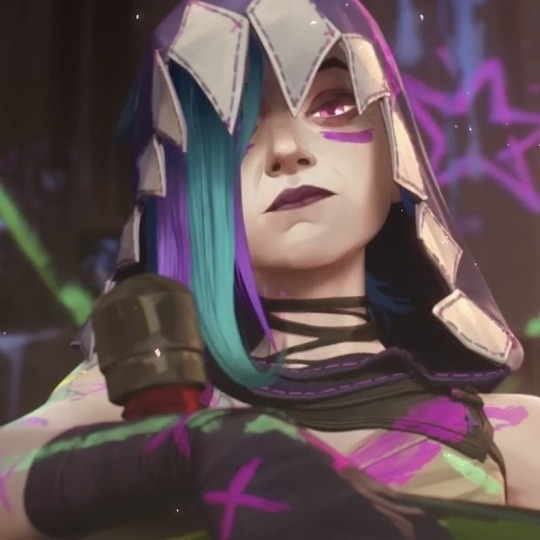
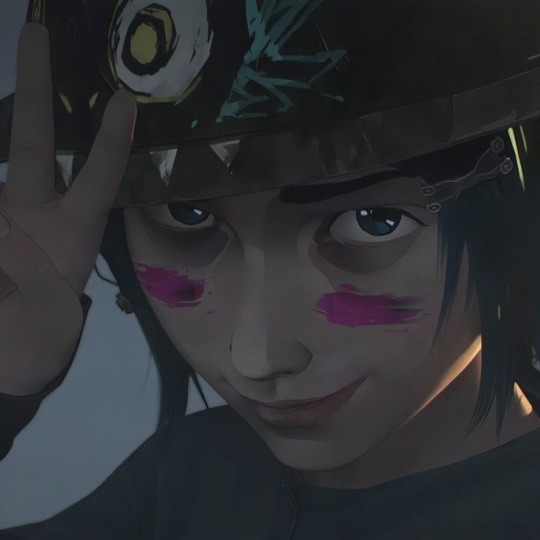
What I keep going back to is the idea that maybe, just maybe, this has to do with her possibly "taking the lead" in Zaun; whether she actively becomes a leader or if she just "leads by example" (therefore passively), it doesn't change the fact that for better or worse she will be depicted as a leading revolutionary figure.
And fair enough: she singlehandedly killed half of the Council, the people who hold decisional power and have contributed to the misery on the other side of the river. After Vender's failed attempt on the bridge and Silco's focus on his own business dealings with Piltover among everything else he did, Jinx's attack on the city - something she does to ultimately solidify her identity as Jinx - opens a door that the Undercity was waiting to be opened for decades.
Here's the thing:
Being Jinx doesn't just mean acting on unbridled rage and being a menace to society; it means being feared by most, if not all, with the only possible exceptions being those who also accepted their inner monster. To put it in Singed's words, "If you take this path, they will despise you".
Being Jinx fundamentally implies loneliness.
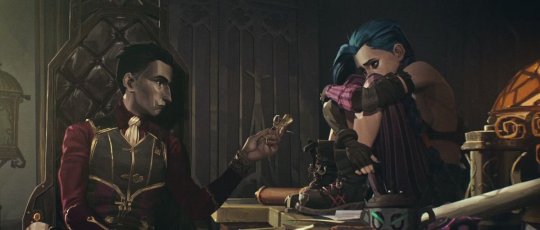
Silco was consistently reminding her this: "I am your family; everyone else betrays us" / "Everyone betrays us Jinx! Vander! Her! They will never understand, it's only us".
In the official clip 'Enemy of my enemy' we find out that he only saw her cry twice, the two scenes we also witness as an audience, meaning he didn't see her cry once during the timeskip, and I'm sure it's safe to say that she most definitely did cry a lot given how she goes from episode 3 Powder (scared, couldn't grasp the concept of killing someone, heartbroken by the nickname jinx) to episode 4 Powder (a beast, kills in cold blood, has taken Jinx as her actual name)... it must've been an ugly transition, and it definitely didn't happen overnight; if Silco, who was the closest person she had all that time, didn't see it, then I think it speaks a lot on how alone Jinx really was in her darkest times.
For all the love he had for her, he reinforced this idea of isolation as an unescapable consequence of the right path, and I think this is also reflected in the lair that (supposedly) he found for her, especially when you compare it to the Firelights’ one:
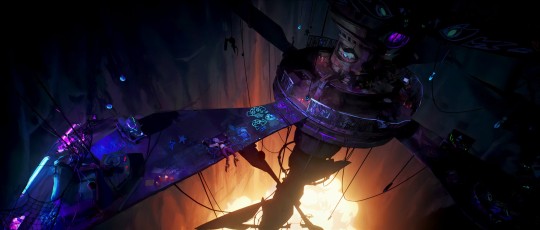
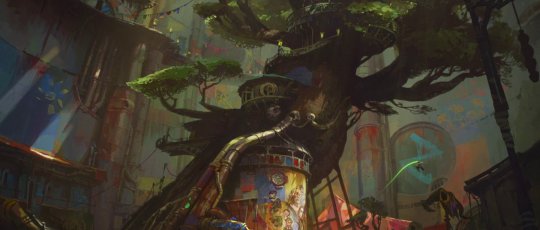
The Firelights (this is important for later) are all about community and sharing joy as well as struggle and pain; they live in a place of healing, filled with life, without a roof so the sunlight can reach them during the day, and at nights living bugs that shine a light of their own fill up the hideout.
Jinx's place is diametrically opposed to this: it’s dark and looks cold, it's completely made of metal, the roof’s blocking any natural light and it hangs above an abyss with no bottom to be seen; the only company she consistently has are the puppets of her dead brothers and the only living thing that knows his way in is the only one that can understand, the only one she can rely on - aka Silco himself.
However, as Jinx herself knows, this may have worked for him, but it wasn't working for her for the longest time: she never stopped yearning for affection, love, friendship- that part of her never really went away; it was only being suppressed, suffocated, maybe unintentionally, and I strongly believe that it only worsen her trauma, and it's one of the things that made her spiral so bad into her depression, to the point of hallucinating.
I think that Silco's line in the baptism scene is particularly relevant here: "You need to let Powder die, so the fear of pain will no longer control you", where the fear of pain would refer to the fear of being on her own, of always failing and disappointing others, of being weak and never satisfying the desires, expectations, hopes that Powder carried within her to be “a valuable member of the team”.
If she lets Powder die (which again, she does in the final episode of season 1), this is no longer a problem: if she doesn't do teams, because teams don't want a jinx to begin with, that fear can't get to her; if she's a solo player, a self-sufficient loose cannon, she won't need to rely on anyone but herself because she's strong on her own and does not need the support of others.
If her power lays in the monster she is, the one everyone condemns her for being, then that childhood wish of hers just isn't a realistic option.
...but then this happens.
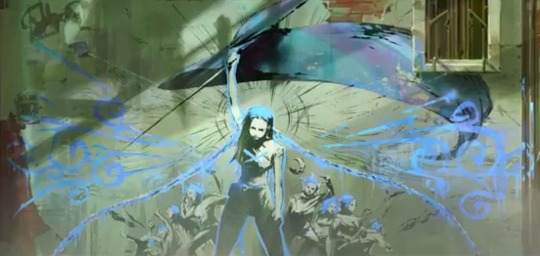
We know from the teaser trailer that in the operation Caitlyn's leading, 'finding Jinx' and 'neutralize any agent still loyal to Silco' are separate objectives. Which makes sense, since as far as they know Silco was the leader of a group of people, and now that he's gone Jinx is an individual under her own agency and her own agency alone. If initially she fights by herself, for herself because she can and fuck Piltover, then it all falls in line with what I stated so far.
But then we hear Sevika, who has hated Jinx's guts and who Jinx has hated back since day one, telling her to get the people together, to unite the Undercity as one because she can do that. Mind you, the girl has lived in Zaun all her life, she knows damn well that the end of Piltover is something the entire Undercity has been waiting for (“Imagine what the whole of the Lances could do!” from episode 2); yet despite this she needs to be openly told what is going on, that she’s not sizing the opportunity she’s created. She isn't, cause... her? Leading? A group of people? No. Not after the last time she tried to help, and most importantly, not after everything she learned under Silco.
Jinx can't fathom the idea of herself as a part of a part of a team. How can she? She literally just came to terms with isolation as ever present- and now, for some reason, the people of the city, who always either ran away from her or wanted her gone, are dying their hair blue in her image, trusting her, following her, painting murals of her as the bringer of revolution.
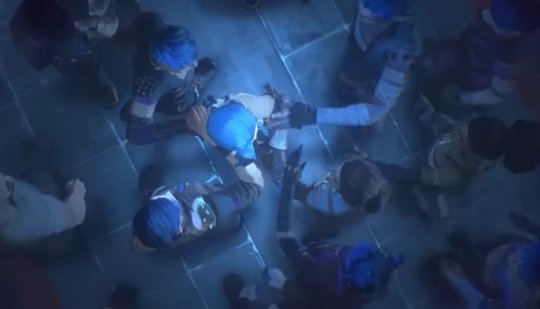

She isn't taking power forcibly like Silco did; she's just doing her thing, her Jinx thing, and Zaun, on its own, is choosing her as the leading figure.
Imagine how frustrating it must be for Jinx to look back and realize that Silco, her father- who has loved her, forgiven her, raised her, called her perfect, defended her, was there for her, saved her, guided her- was wrong, and put her in a condition of never ending existential pain when she could’ve had it differently the entire time; imagine how confusing it must be for her to look back and realize that it never mattered whether or not others understood her, 'cause she wasn't as unlovable or unforgivable as she thought herself to be in the first place, that Silco and Vi were never her only options.
Imagine how painful it must be for her to look back and realize that for all this time she could’ve had friends and be accepted and be trusted and rely on others because she never HAD to be alone.
...keeping this in mind, let's talk about Ekko and the missing flashback from episode 7 for a moment.
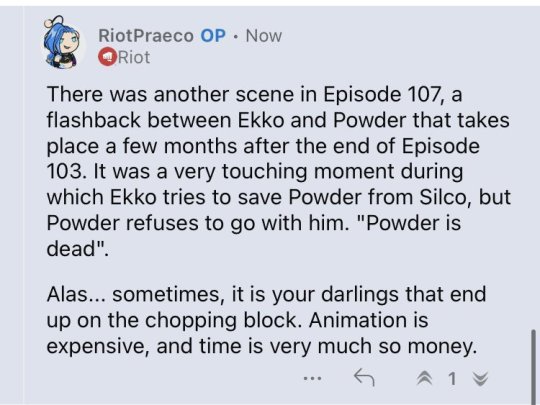
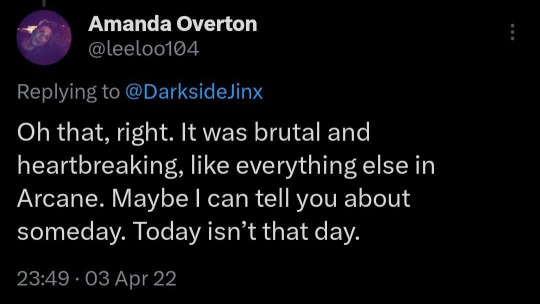
Admittedly we don’t have a lot of information, other than it took place not too long after the events of episode 3 (then again, to be fair, we don’t know a lot about their relationship as enemies as well: it’s all between the lines; I surely have my own opinions of how they feel about each other being on the enemy side, but I don’t believe it’s super relevant here). What’s for sure about this flashback is that it was a defining moment in both Ekko and Powder’s journey, especially for the latter. Someone surely died, and it 100% was Powder’s fault. It could be both the result of her very first crisis or her first intentional murder; in both cases it results in her deciding for herself to align with Silco as opposed to her best friend.
The way I like to see it is that, since the trauma was still very fresh, she might have been too scared of the idea of fighting alongside others after what happened last time, and she pushed herself to kill someone on purpose just to push Ekko away and prove a point (Silco’s point). I love the idea of the tragic irony of Ekko being the one person Powder managed to really save, and Powder being the one person Ekko couldn’t.
Personal headcanons aside though, the last part is the most important one here: Ekko couldn’t save Powder from Silco, and by extension everything he represents.
I’d like to point out that one of the most tragic aspects of the two becoming enemies (to me) is that, throughout those years, they reciprocally were the only living person the other shared a past with (well, Vi too, but she was in prison the entire time).
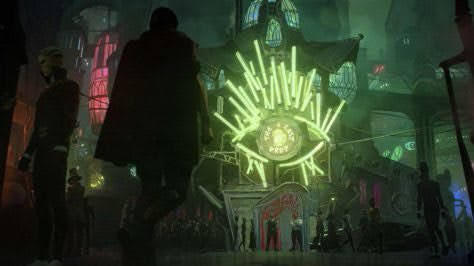
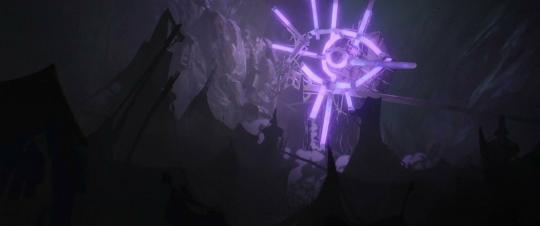
Silco not only takes over by force, he also marks as his all the places of said past: the Last Drop, Vi and Powder’s house… one line that always stuck with me from episode 7 is when Ekko tells Vi “All that’s left is Jinx, and she belongs to Silco”.
Not with Silco; to Silco. As if she too a piece of the past he turned into his property.
It’s like he understands that while yes, Powder made the decision by herself, that she wants to stay with Silco, he also knows that the man is the one to blame for... well, all of it; the kid was there when Silco showed up unprovoked at Benzo’s place, he knows things went downhill from there.
Ekko knows that he is the bigger problem and the bigger enemy. Even Vi, without knowing a thing about the past few years, can tell Silco put some shit into her sister’s head; Ekko can probably guess the same, difference being that Ekko has the responsibility of keeping other people safe, and he can’t risk it all for someone that, while possibly manipulated, ultimately isn’t collaborative. Ekko can’t jeopardize all he’s built and done for his former best friend, no matter how much it hurts him to be her enemy.
Back to season 2.
Like the entire fandom has already pointed out, there’s a 99.9% chance there will be an alliance between them and Jinx, especially when looking at Ekko’s new outfit.
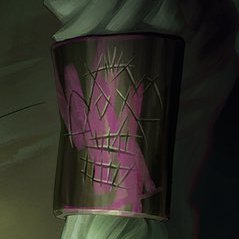
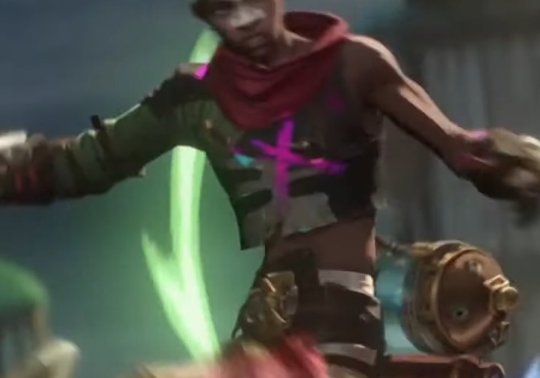
Of course, this will not be immediate: my guess is that while Jinx works alone at the very start Ekko will be with Heimerdinger and following the arrest of the Firelights we see in the trailer maybe there’s a split. And even after Jinx takes charge so to speak, and possibly frees them, among others, from Stillwater, it’s possible there will be (and there should be) stages in the alliance: initial distrust, potential fight within the community- like yeah, let’s not forget what Jinx did to these people.
Even if they do go ahead with it, it is probably out of necessity more than anything else, with not one but two military forces against the whole of the Underground. It’s not like they’d be the most ecstatic faction about it, and the same goes for Ekko, which is why the new look will probably come in later.
But exactly like he could see Powder for a brief second on the bridge clearly enough for him to stop himself from beating her, he will, most definitely, see her again through Jinx's inner turmoil... that, and she also can’t keep her shit together when it comes to what she's feeling, the girl really is an open book.
And yeah, the situation would be pretty emotionally disorienting: she's being as Jinx as ever, but people like her now, which is something she used to want as Powder, who is supposed to be dead, and they're willingly following her like they willingly followed Vander and there's murals of her with him, though she's pursuing what aligns more with Silco's dream, but also turns out Silco was wrong about Powder, who might still be alive deep down- the whole thing is a big big mess.
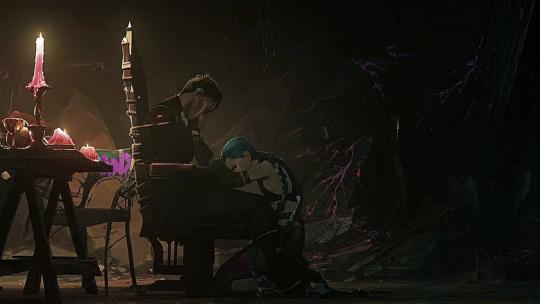
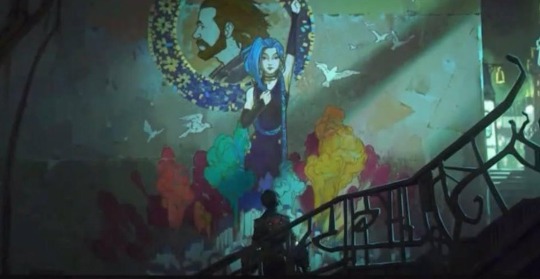
Despite everything that I said about him, it’s not like Jinx would start to resent Silco. She could never, not after his last words to her. They mean the world to her, he means too much to her, and let’s not forget she probably hear his voice now too, along Mylo’s and Claggor’s; it might even be a calming voice to her, one she’s happy to hear even if she knows he’s not real… which makes it all worse and more painful to deal with.
In this scene from the trailer, it seems like Ekko’s talking to her (some have pointed out the blue hair out of focus). Since this is still the look in season, at this point in time Ekko (and the rest of the Firelights) are not truly committed to this alliance with Jinx, and vice versa, Jinx is still figuring out how to deal with all this unexpected appreciation.
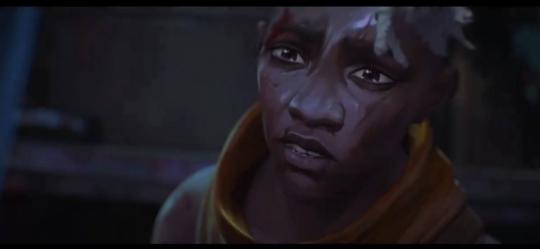
If there’s one thing we’ve learned about Jinx’s way of dealing with inner conflicts, especially ones that deal with the memories of the past, is that it often leads to disaster. This is a bit of a long shot, but what if the reason Ekko’s so beat up Is because she unintentionally sabotaged one of their own attacks on Piltover? Or perhaps they were caught up in a tough situation because of something she did or didn’t do? My point is that if he really is talking with her while in this condition, she probably is in a similar one.
Regardless, they are on the same side, and they are having a conversation. This is very likely the first time they reach out for each other since the day she chose to not go with him.
And I think it’s believable that of all the people she now has beside her, she’d talk to Ekko: he has this leader stuff already figured out. He has and still is taking care of people and keeping them safe better than she ever will, and on top of that, he still is the only one in Zaun (again, aside from Vi) who has known her since before she was Jinx, and he spared her on the bridge. He’s the perfect person to open up to.
And, get this, not only Ekko understands the pressure of taking the lead: he knows what it means to look back at someone you were fond of and feeling the pain of being wronged by them. He knows what it’s like to look back at old memories of someone you trusted and wonder if all those moments together really were what you thought they were, he knows what it’s like to wish it could all go back like it was, just so that candid version of them you have in your mind can still be true, present and untainted by the ugliness that now ruins all those precious moments.
He knows, 'cause he went through it with her... and now he can finally reach her.
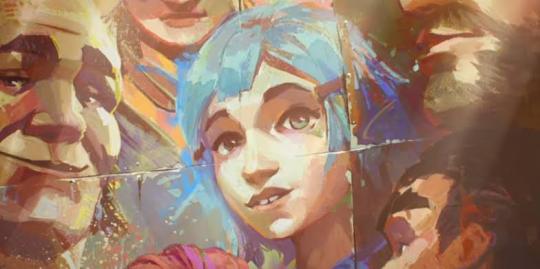
Ekko may have not been able to save her from Silco then, but he can save her from Silco now.
And since he has built a community that grieved together, went through pain and joy together, he simply does what he’s always done with the Firelights. Sharing.
He tells with her what has worked for him: “Sometimes, taking a leap forward means leaving a few things behind”- in the Franch dub he says “leaving a part of oneself behind”- meaning it doesn’t have to be all or nothing: she has the power to choose what to kiss goodbye and what can stay…
…and then she cuts her hair.
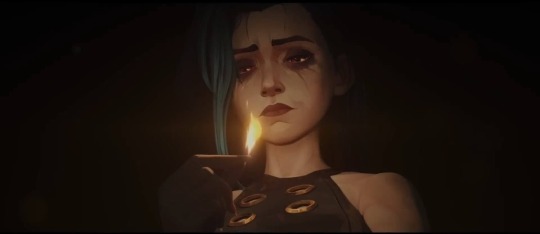
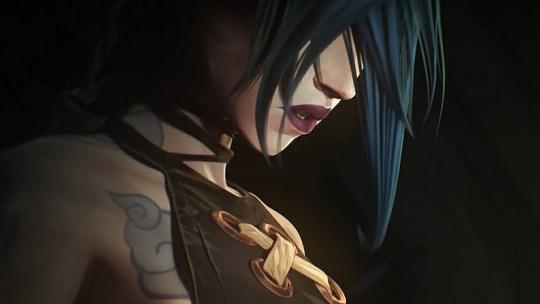
I think it’s important to note how these two moments are very similar in setting. I kid you not, the first time I watched the trailer I was convinced this was a scene where Jinx was burning Silco’s body after she killed him- which frankly could still be the case. I’ve also seen discussions being made for the little girl we see in the trailer being burned here, or Sevika, but I don’t think it’s either. Jinx is completely desensitized to death, even when Silco died her makeup isn’t this ruined. My guess is that this is something much deeper:
Jinx never properly grieved the past. Ever. So, maybe, she’s burning the part of herself she’s leaving behind. The hair she cut.
The hair Silco used to braid for her.
These two scenes parallel each other because “nothing ever stays dead”, but Silco must stay dead, for her own sake. For her own happiness: she is leaving him behind for good.
Only after this moment we get the new look for Ekko: he can work with this new Jinx, the one that now knows she can work within a team, even to the point of committing to the outfit (lol).
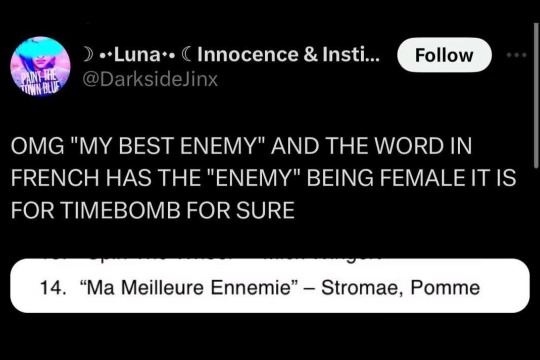
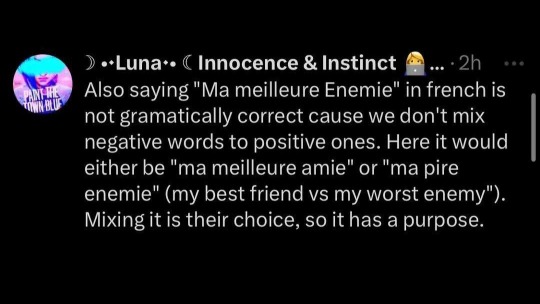
If in season 1 Jinx accepted her identity as it was defined by Silco, in season 2 she's re-inventing it under her own conditions: she gets to choose what "being Jinx" may or may not include. And it will always include a little bit of Powder.
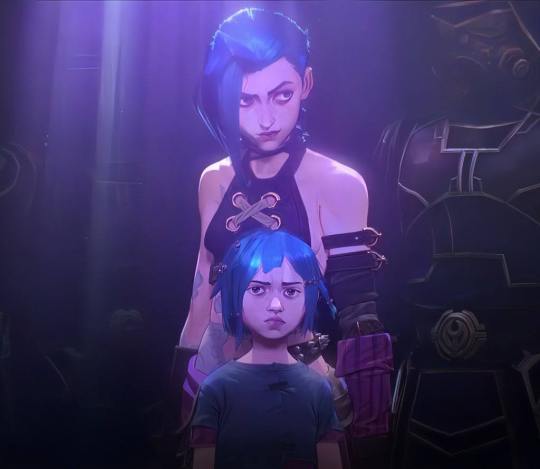
Thanks for reading! 💚💙
#or I could be completely wrong#and someone just cuts it#but still#it was fun to write this#arcane theory#except not really#arcane#arcane season 2#jinx arcane#ekko arcane#arcane silco#powder#timebomb#i ship it#but this also works platonically
89 notes
·
View notes